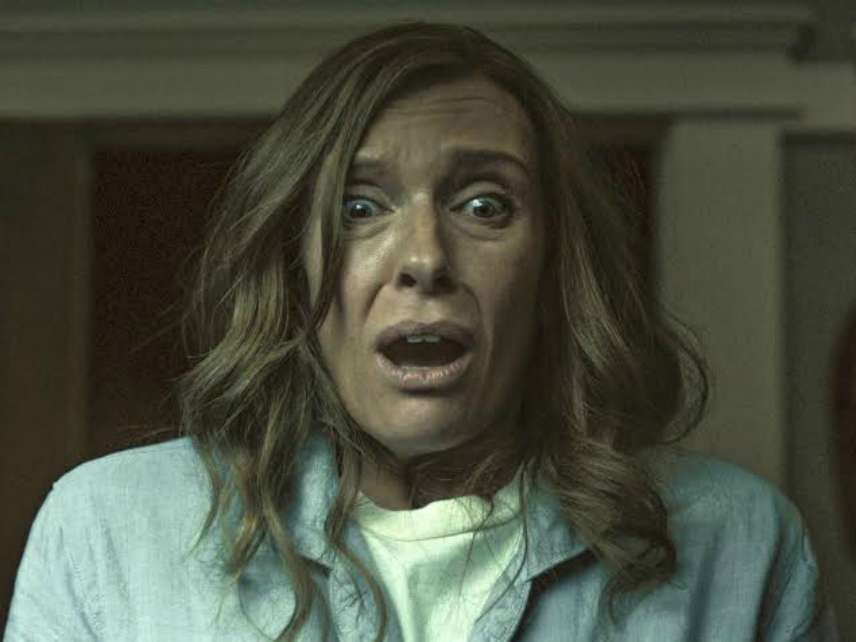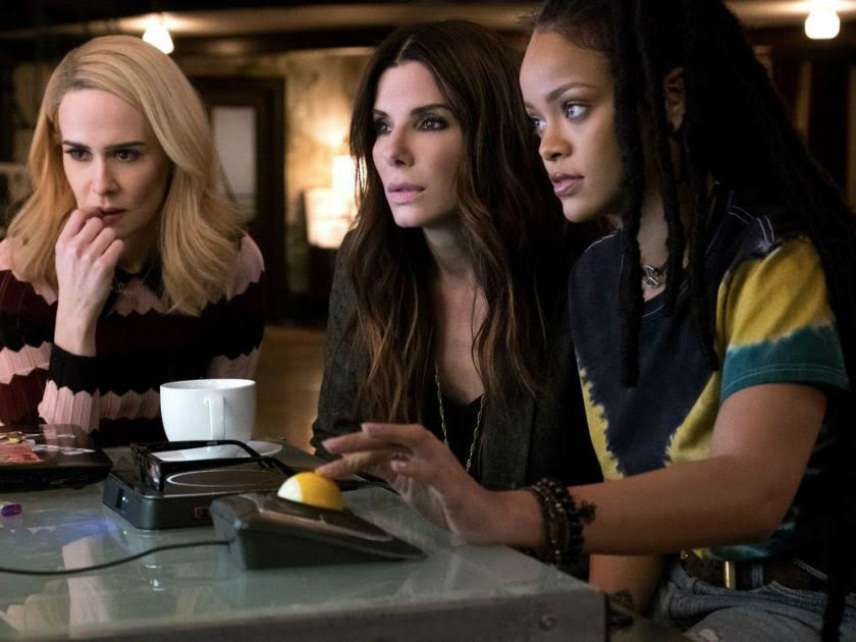Movie Reviews: Hereditary and Ocean's 8
An instant-classic horror film, and a gimmicky retread.

Horror begins at home in the terrible world of Hereditary, a maximally disturbing first feature by writer-director Ari Aster. The home at the center of things is a big rambling wooden house inhabited by the Graham family: amiable psychotherapist Steve (Gabriel Byrne), his tightly wound artist wife Annie (Toni Collette), their stoner son Peter (Alex Wolff) and strange younger daughter Charlie (Milly Shapiro). In addition to this main domicile, there are also the miniature houses Annie builds in her workshop for exhibition in art galleries—scaled-down structures in which she sometimes stages unsettling domestic scenes from her troubled life. Then there's the imposing treehouse out in the family's woodsy backyard, which gives off an eerie red glow late at night. (A reasonable explanation for this is suggested along the way, but do keep wondering.)
The movie is a very grown-up undertaking. We see no monsters, no teen sex, none of the usual fright-flick fodder. Instead we're invited to contemplate the torments of mental instability and the awful intimacies of family life, as well as whatever malignant forces may lurk behind the veil of everyday existence. Aster knows his way around the cinematic scary-movie tradition, and there are clear echoes of Rosemary's Baby here, as well as glancing nods toward The Omen, The Blair Witch Project, and, in one creepy shot, The Exorcist III. The movie's most unnerving components, though—the ones that are likely to have you peering through your fingers—are of the director's own creation.
The story begins with a funeral. Annie's mother has just died, and she doesn't know how to feel about it. The old woman was secretive and difficult, and Annie was bitterly estranged from her. "Should I be sad?" she asks her husband. She's not sad. But she's worried. Her daughter Charlie was grandmom's favorite family member, and the old woman forged an intensely close relationship with the little girl, who has grown dark and bizarre. (To emphasize this, Milly Shapiro—once the peppy star of Broadway's Matilda the Musical—has been made up and photographed to resemble a potato-faced medieval peasant.)
The film's early innings provide a generous amount of character development—the backstory of a family that is slowly, horribly falling apart—along with a certain amount of coffin consciousness, grave desecration, and grisly pigeon action. Then, in a sequence that begins at a teen house party, the movie leaps into screaming high gear, and a rich tide of dread rises as the movie's alarming story starts to become clear, and then—worse yet—even clearer. (There are, among other things, weird figures in the woods, more icky insects than anyone might ever need to see, and Ann Dowd as a local woman promoting séances as a way to reestablish contact with Anna's dead mom—because "she's not gone!") It is a measure of Aster's originality that any more-detailed revelations would wreck the movie's several world-class shocks.
But tribute must be paid to Toni Collette, a great actor reaching a new peak of brilliance here as a woman being consumed by her malign mental inheritance. Collette soars and rages; she tiptoes up to the edge of overacting in a couple of fiery rants, but she never crosses over, and she's unforgettable. Oscar voters are generally uninclined to reward horror films in significant ways, but Collette's stellar performance here will be very hard to deny.
Ocean's 8

It's odd, isn't it, that the two juiciest performances in the all-female Ocean's 8 are given by Anne Hathaway—so often derided as talentless for no reason at all—and James Corden, who's best-known in this country as a TV host? This is not something you'd expect in a movie whose cast also includes Sandra Bullock, Cate Blanchett, Mindy Kaling, Helena Bonham Carter, Sarah Paulson, rapper-comic Awkwafina, and—why not?—Rihanna. But there it is. The picture slumps under the weight of its condescending concept: Let's insert a bunch of women into a narrative blueprint originated by men, and bring in another man to direct and cowrite it. How could this go wrong?
Well, in a number of ways. The director, Gary Ross (The Hunger Games), who crafted the script with Olivia Milch, seems to have little flair for the sort of sparkling dialogue that comical heist movies like this require, and he's not a master of elegant movement or cleanly staged action, either. This could not be said of the three earlier Ocean's movies directed by Steven Soderbergh (a producer on this one). And while the filmmakers may be hoping that Ocean's 8 will be the beginning of their own trilogy—with 9 and 10 hooking up with Soderbergh's Eleven and possibly spawning some sort of giant boys-meet-girls crossover to the enormous financial benefit of all—I would say, having seen this one, that such a result is not entirely probable.
Here's how the story works. Sandra Bullock is Debbie Ocean, sister of the recently deceased Danny Ocean (played by George Clooney in the Soderbergh films). Fresh off a five-year prison stretch for fraud, Debbie scams her way around Manhattan (one of the movie's livelier sequences) and starts assembling a group of old pals to help execute a plan she's had years to work out. It involves all of them getting into the annual Met Ball at the Metropolitan Museum of Art—no easy feat for non-movie characters—and stealing a $150-million necklace that's due to be worn by a professionally fabulous celebrity (Hathaway).
The preparations for this job, and its subsequent execution, should be the movie's most compelling elements, clever, tense and funny. Some of them—the search for dead spots in security-cam coverage, the plan for employing a 3D printer—are clever; but the details of the heist are never crystal clear. And the fact that that the movie gets no satirical mileage out of all the glittery-ridiculous fashionisti on hand (even the back of Anna Wintour's head passes through) suggests the ancient truth that celebrity access has its price.
In addition, the cast never works up the sort of razzmatazz chemistry—pioneered by the Sinatra Rat Pack in the original Ocean's 11 in 1960—that might have carried the movie over its sometimes dull plot mechanics. Helena Bonham Carter has some good ditzy moments, and Awkwafina some funny pickpocket moves; but Mindy Kaling and Sarah Paulson aren't given much of interest to do; Blanchett is strangely unengaging; Rihanna doesn't have a lot of range as an actor; and Bullock, whose face seems frozen throughout the film, is unable to communicate much thought or emotion. James Corden's appearance toward the end (as a voluble insurance investigator) is much more of a relief than anyone connected with the picture would seem likely to have wanted.


Show Comments (49)